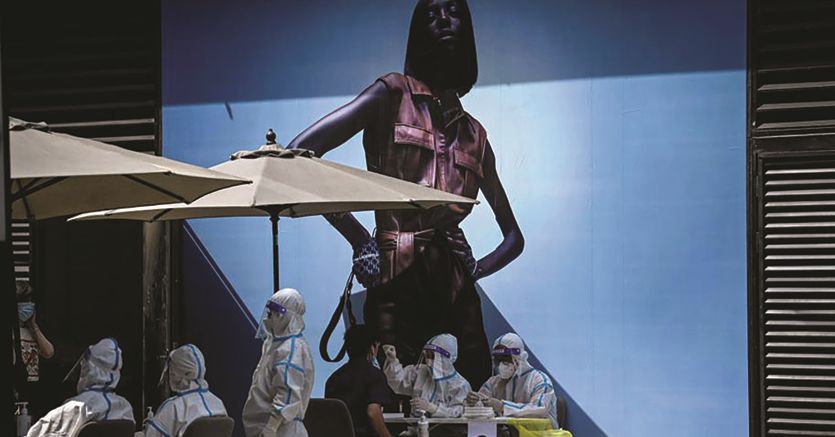The key points
- China absorbs over 1/5 of the luxury personal goods market which reached 283 billion euros in 2021 according to Bain & Co.
- In the first quarter of 2022, due to the closures that involved Shanghai, Beijing and many other provinces, luxury in China recorded a decline of 30% on average
- Among the problems is that of the slowdown in logistics that impacts on online purchases: in China, 26% of luxury purchases are worth
I 26 million Shanghai citizens forced into their homes by could see the first glimmer of freedom on Monday 23 May, with the partial reopening of some commercial activities and the subway. Pending the fall of the restrictions scheduled for early June. But in many other provinces of China, including Beijing, the Covid Zero strategy forces hundreds of thousands of people into their homes (or offices). A step back in time for the former Celestial Empire which in the second half of 2020 and throughout 2021 had resumed living almost normally (albeit with closed borders) while the virus spread to Europe and the USA. A low blow for the Chinese economy – both the Monetary Fund and S & P have revised their GDP growth estimates downwards – but also for the luxury companies that have their own market of choice in China.
The impact of closures
According to estimates by Bain & Co., in fact, the People’s Republic today has a market share equal to 21% of the 283 billion euros of revenues from personal luxury goods and is a candidate to become the first market for luxury goods by 2025, when the value should reach 360-380 billion euros. If the long-term growth scenario should not experience particular repercussions, the closures of recent months have nevertheless had an important impact: “The intensity of the 2022 lockdowns, which began in mid-February and are still ongoing, combined with the fact that, unlike what happened in 2020, the restrictions have led to a blockage of logistics centers – explains Federica Levato, partner Bain & Co, Fashion and Luxury Goods practice – makes it inevitable that there will be effects on the purchases of luxury consumers in China: on average, between January and April, there was a 30% drop in sales ». However, it is a temporary crisis: «The Chinese want to go back to normal, to go out and buy in the store or online Consumer confidence has not diminished at all. It is only on stand-by, due to this exogenous event ”, says Levato.
The crux of politics
Luca Solca, senior research analyst Global luxury goods at Bernstein agrees: “Companies estimate a negative impact of about 30% on the first quarter – but even if the lockdowns continue throughout Q2 (which for many companies closes at the end of June, ed) the effect would not be dramatic: as soon as the logistics restart, digital purchases will also do so and, as soon as possible, the Chinese will return to shop in stores, so much so that almost all the big brands are planning on-site openings ” . A determining factor in the future of China and, consequently, of the luxury companies that do business in the People’s Republic, will be the choices of the central government: “A change in the approach to managing the pandemic is expected: the” Covid zero “It is damaging the economy and displeasing the population.” A not exactly idyllic scenario with the XX Congress of the Chinese Communist Party at the gates (to be held in the autumn) which may or may not confirm the appointment of Xi Jinping as party general secretary for the third time.
A change of pace in Chinese policies is also hoped for by luxury companies, which in addition to having to deal with the absence of Chinese tourists in Italy and Europe (they absorbed a third of tax free purchases before Covid) due to the closure of borders, now they have to manage the effects of these very strict closures. “The lockdowns in China certainly represent an element of debate and concern – says Matteo Lunelli, president of Altagamma -. This Covid zero policy has quite drastic effects ».
The effects on online sales
The lockdowns, this time, also had an impact on logistics. With consequences, not only for physical sales channels, but also for digital ones which in 2020 had accelerated their growth exponentially. Also according to Bain & Co., in 2021 online sales of personal luxury goods rose by 56% reaching a penetration of 26% (including duty free). Consequences that, even in this case, are not undermining consumer confidence: «Our business has proved particularly resilient with respect to circumstances that we have all come to know well. And the situation as a whole is quite limited compared to our business volumes in China – says Giuseppe Giglio, president and CEO of Giglio.com, a company that sells luxury multi-brand products all over the world -. From the point of view of couriers, delays are occurring, but the same Chinese customer – who has learned to manage online purchases, in the new ways imposed by the current situation – does not seem discouraged with regards to purchasing on our portal. In no case, however, has all this conditioned the great growth we are recording in Apac, a strategic market for our 2022 objectives “. In detail, in the first quarter of the year, Giglio.com sales grew by +176 percent.
